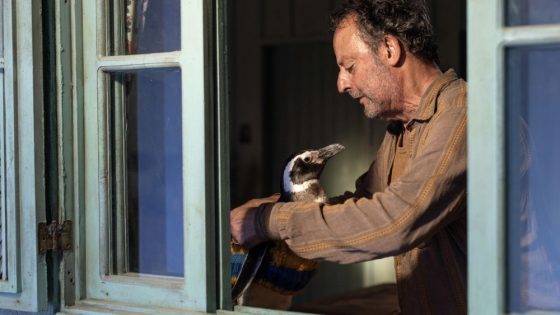It’s been a few decades since last we saw Jean Reno playing a withdrawn curmudgeon protecting a pint-sized charge in “The Professional.” Now, with director David Schurmann’s “My Penguin Friend,” it’s a welcome return to a winning formula.
In the Brazilian filmmaker’s tender-hearted, all-ages adventure, Reno plays a grief-stricken father who gains a small, sweet companion after rescuing him from polluted waters. Inspired by the unshakeable bond between a real-life Brazilian fisherman and a Magellanic penguin thrown off his migration route, the French actor reveals new colors as a performer, shading the picture’s playful and poignant overtones with sensitivity and subtlety, making this a must-see for those who love uplifting stories about redemption, perseverance and empathy.
Reno plays João, whose journey began long before his penguin pal’s arrival, when his cozy, beachside home in Ilha Grande, Rio de Janeiro, was filled with love, music and laughter. Played in his younger years by Pedro Urizzi, João was then a caring father to young son Miguel (Juan José Garnica) and a good husband to Maria (Amanda Magalhães). But things drastically changed one fateful day when, while he was out fishing with Miguel, a rough storm at sea overturned their small boat, drowning the boy. Years later — and thousands of miles away in Patagonia, Argentina — DinDim (played by 10 very expressive rescue penguins, all listed by name in the closing credits) is also dealt a dirty hand. As he’s migrating with his colony, he veers off course and winds up stranded in an oil slick, unable to swim, set hopelessly adrift until João rescues him while fishing off a nearby island.
The lonely fisherman immediately feels compelled to help this messy, misguided animal, brokering a deal with Maria (Adriana Barraza, whose supporting work is quietly touching) to clean, shelter and rehabilitate DinDim (who earned his name from a young girl mispronouncing “penguin” in Portuguese). It proves difficult to say their goodbyes as the fish-eating freeloader loves his new, tropical digs. But the little guy leaves in his own time, braving the treacherous trip back to burrow in Patagonia. Yet a blessed surprise occurs when João’s persistent penguin pal returns the following year and their friendship goes viral, drawing the attention of not only the world, but also three researchers (Alexia Moyano, Nicolás Francella and Rochi Hernández) who’ve been monitoring his behavior in his penguin huddle.
Screenwriters Kristen Lazarian and Paulina Lagudi build out the original foundation with great craft and care, turning the sweet but simplistic story into a tale with broadened emotional heights and a sincere, non-preachy ecological message. It deals in nuance, shown in everything from the evolution of João’s grief and the toll it takes on his life, walling himself off from joyful humanity, to the harmful effects of pollution affecting ocean life.
The film tracks the shifts in its human protagonist’s relationship with his best friend Oscar (Maurício Xavier), depicting the role the penguin takes on as surrogate son, without any annoying, extraneous exposition. It speaks volumes without being verbose when João instinctively dotes on the penguin, fashioning a sweater out of his deceased son’s knit hats, and pleads for help from Oscar in the dénouement. By not leaning too heavily on these details, the film makes its understated breakthroughs all the more resonant.
Schurmann, in tandem with his talented crafts team, showcases plenty of visual dexterity — a delightful discovery since family-friendly films of this ilk so often talk down to their audience. He harnesses the power of imagery within sequences ranging from action-heavy (as when João’s boat capsizes in the storm, showing the beauty and brutality of the situation in soft focus and disorienting cross-cuts) and restrained character-driven moments (like Maria’s heartfelt confession and João’s plea for help from townspeople he previously shunned). The film also shows the world through DinDim’s perspective, not solely with the camera shooting from down low, but also through special lenses that imitate his vision. To give a sense of realism during the scenes set in the penguins’ territory, Schurmann partners with wildlife cinematographer Cristian Dimitrius, beautifully capturing the colony’s everyday activities and avoidance of predators, seemingly pulling inspiration from movies such as “The Black Stallion” and “The Bear.”
While the narrative and performances blessedly remain free of broad strokes, false notes or overbearing melodrama, it’s more than a little disappointing that the filmmakers rely heavily on Fernando Velázquez’s manipulative score, especially when the mischievous penguin is TP-ing the bathroom or getting into troubling circumstances. It’s a shame they couldn’t have shown similar restraint in this area, trusting that their audience will be enchanted without musical interference. Using music as a crutch might help youngsters figure out their feelings faster, but for the adults, it reads as pushy. Scenes like DinDim’s trip into town, or his first days in the house would’ve done nicely without the extra, plucky accompaniment of strings. The sound of his cute little webbed feet flippy-flapping across the cobblestones and wood flooring is charming enough to power these sequences on its own.
Still, with a lovely, light sense of humor, a ton of heart and a cadre of cute, cheeky penguins, it’s hard to fault its missteps. Thematic sentiments speaking to the restorative power of love, forgiveness and hope hit hard, culminating in the epilogue showing footage of the dynamic duo and an update on the pair. It serves as a tenderhearted testament to making life-enriching friendships — whether they be with humans, animals or the planet.
Source Agencies



